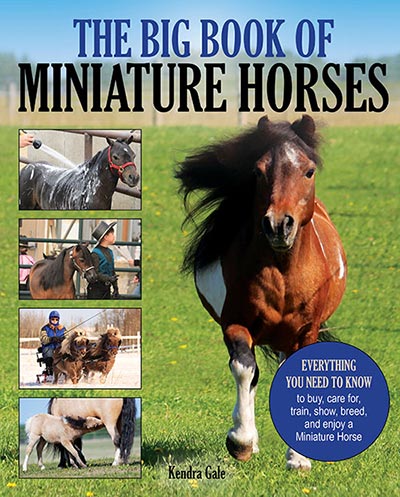
by Kendra Gale
The benefits of interaction with horses are only just beginning to be properly explored, and with their unique small size and very curious personality, Miniature Horses are very well suited to be therapy animals.
Equine Assisted Learning and Equine Assisted Therapy
Using horses as a part of psychotherapy, or to teach life skills, is a rapidly growing modality. Julia Morgan, of Horse Powered Connections, is a certified FEEL practitioner. FEEL stands for Facilitated Equine Experiential Learning, and horses are a very active participant in the process. Using a horse-led series of exercises, equine experiential learning works with the horse’s natural sensitivity to physical movement and emotional states to help people gain self-knowledge and acquire skills leading to personal growth through positive life changes.
Julia’s focus is on children. Her journey began with her own son, who was non-verbal and diagnosed as severely autistic. He is now an outgoing, talkative, and confident little boy, a transformation that Julia credits to the horses and learning to connect with his environment more like a horse would. Julia enjoys working with children and finds a special joy in helping children face the challenges arising from ADD (attention deficit disorders), anxiety, and ASD (autism spectrum disorder). She has seen remarkable changes from children’s interactions with the horses, from a teenage girl with ADHD (attention deficit hyperactivity disorder) who proclaimed that her brain had never been so quiet, to a young autistic boy who was once again excited to go to school and make new friends because he’d been able to make friends with the horse.
Emotional intelligence, management, nonverbal communication, and connection is a big part of what Julia does for people of all ages, and her clients find great value in the honest, judgment-free responses of the horses. She also works with business and corporate clients, allowing the horses to be the expert instructors in verbal and non-verbal communication, and awareness of the energy they bring to their business interactions, skills that align well with creating good business relationships.
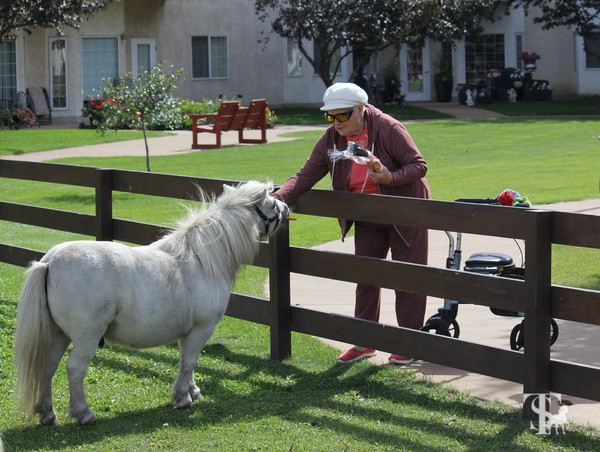
Many of the horses that Julia works with in her program are rescues, some with physical or emotional issues that have benefited dramatically from being a part of a system that listens as carefully to the needs of the horse as it does the human participants. Since Julia’s focus is on children, a Miniature Horse seemed like a good addition to the herd.
The small size of the Miniature Horse is ideal for children who might feel intimidated by a full-sized horse, and though her Miniature Horse Jerome is new to the program, as well as new to working with children, Julia finds him highly intuitive and very concerned about the well-being of his small charges. Jerome has some soundness issues that preclude him from a career as a performance horse, but he is keen to work at his new job, one that is low impact but mentally stimulating.
Pet Therapy and Visitations
The idea that spending time with horses is therapeutic isn’t a new one. The oft-used quote, “The outside of a horse is good for the inside of a man,” has been around so long that we aren’t even sure who said it. But far beyond anecdote, studies have shown that horses do have therapeutic value in many ways.
Miniature Horses are uniquely suited to many aspects of pet therapy, with their small size allowing them access to places that regular horses simply couldn’t go. The temperament of a Miniature Horse is smart and curious, and like all horses, they are highly intuitive, seeming to just “know” when they need to be extra gentle with those around them.
At the Shepard’s Care Kensington Campus, in Edmonton, Alberta, Miniature Horses are involved in a unique program. As an “aging in place” facility, Kensington is home to 600 residents, and offers every form of housing, from independent apartments to assisted living and long-term care. The beautiful and spacious courtyard at the center of the facility is home to fountains, trees, flowers, and vegetable gardens, and the winding pathways take you to a small barn and paddock where residents can visit Miniature Horses.
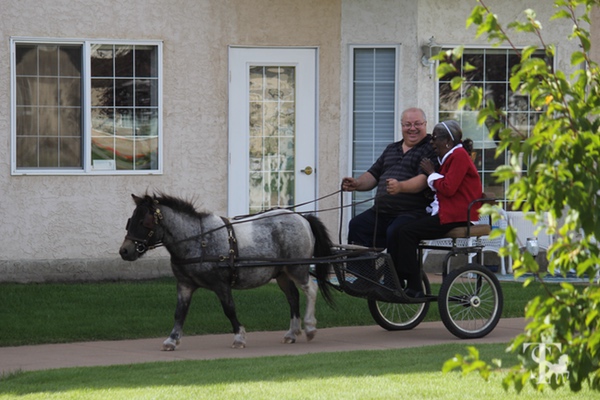
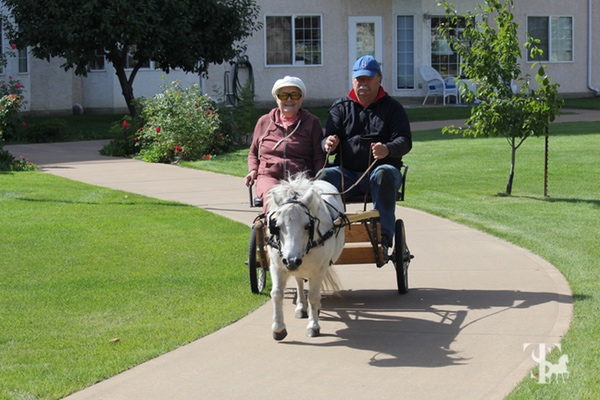
The vision and dedication of Dan Bisson, Recreation Manager at Kensington, was the driving force behind this unique program first established in 2010. Throughout the summer months, two Miniature Horses live on campus for two-week intervals, and Dan says there have been three major benefits for the residents of Kensington. First, it gets more people outside and into the courtyard. The day I visited, as soon as the horses arrived for another two-week stay, residents—who must have been watching from windows awaiting the horses’ arrival—appeared with bags of carrots. Several residents told me they come every day to see the horses, another that he checks on them every night before bed.
The second benefit that quickly became obvious was that the residents received more visitors during the times that the horses were on site, and they were able to share the enjoyment with their children and grandchildren. And the third benefit that Dan outlined was they were able take the horses inside the building to visit residents who aren’t mobile, giving everyone the opportunity to enjoy and interact with the horses, an activity that wouldn’t be possible with a regular-sized horse. Residents who can’t go outside enjoy watching them from their window, and many make a point of checking on them regularly.
The horses involved in this exceptional program usually live at Hollyhock Meadow, a Miniature Horse farm not far from the city, with owners Peter and Terry Holt. Peter and Terry are dedicated to sharing their horses with others, and spend their summers with a steady stream of pet-therapy commitments, both taking their horses to visit others, and having groups tour the farm. The groups are mostly from seniors’ care homes, but they also work with people with Down syndrome and special needs children. There are endless stories about reactions from people who haven’t responded to anything in years, ranging from the big smile from petting a horse, to a child that is never still, sitting quietly and enjoying a ride in a cart behind a calm and experienced Miniature Horse.
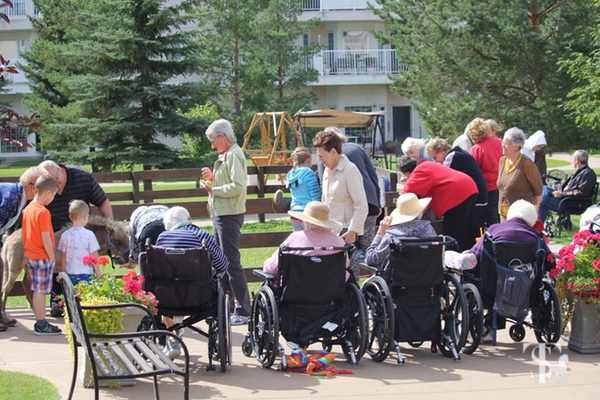
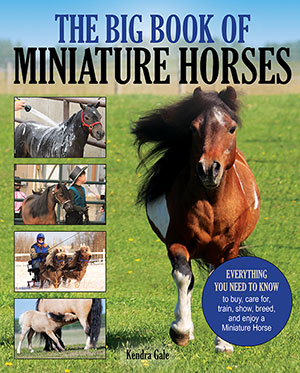 The Big Book of Miniature Horses
The Big Book of Miniature Horses
BUY NOW on AMAZON
Kindle | Paperback
If your interest is in pet therapy and sharing your Miniature Horse with others, you’ll need a horse that is suited to the work. Based on Peter and Terry’s experience, horses that are too quiet don’t make the best choice because they are less likely to engage and interact with people. A horse with a natural curiosity that is bold and brave enough to enjoy new things and going to new places is ideal.
While these have been very specific examples of Miniature Horses being used for a therapeutic purpose, there are so many ways that you can share your horses to make people smile, and lots of organizations that can help you along the way.
This excerpt from The Big Book of Miniature Horses by Kendra Gale is reprinted with permission from Trafalgar Square Books. Find out more about Trafalgar Square Books, visit our BOOKS section.
Learn more about Miniature Horses on our Horse Breeds section. Learn more about Equine Assisted Therapy on our Therapeutic Riding page.

































